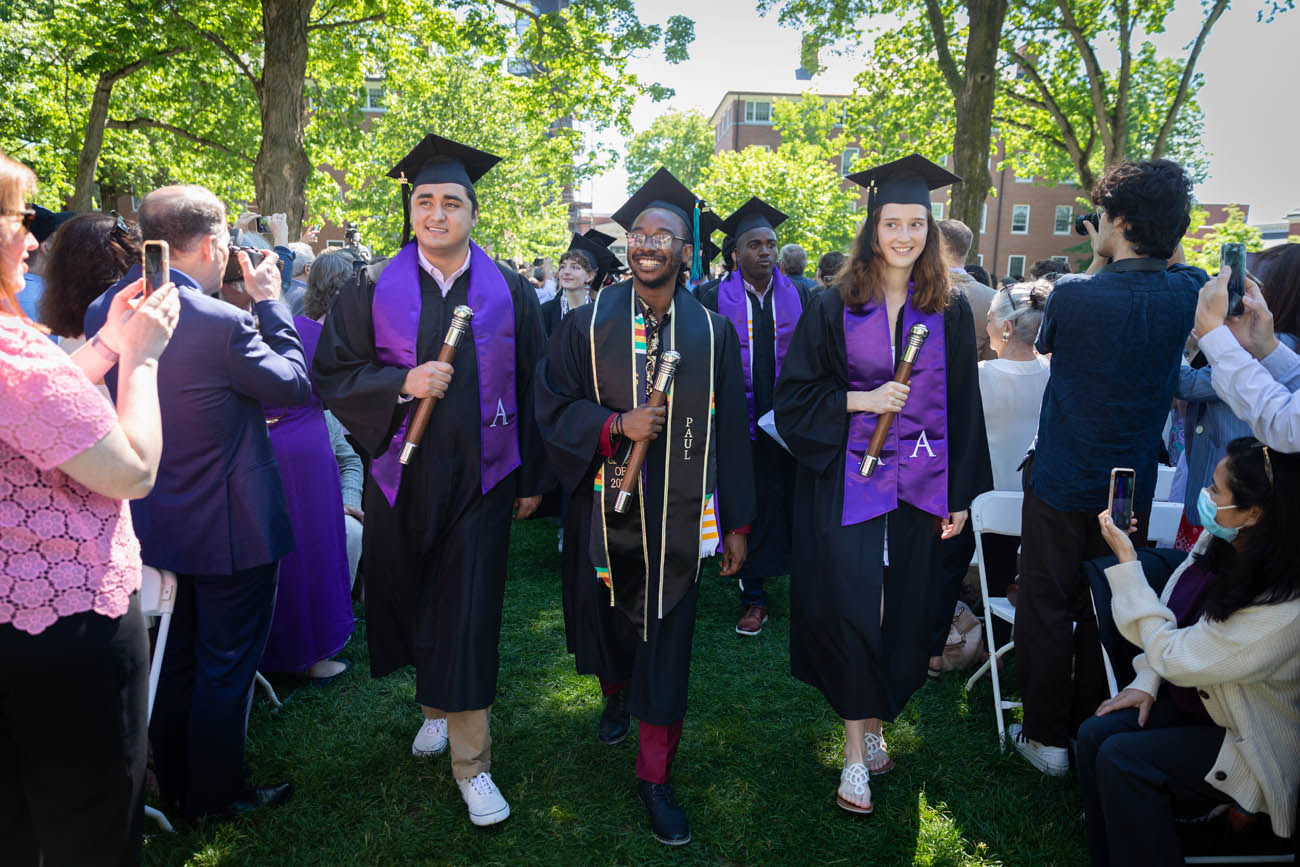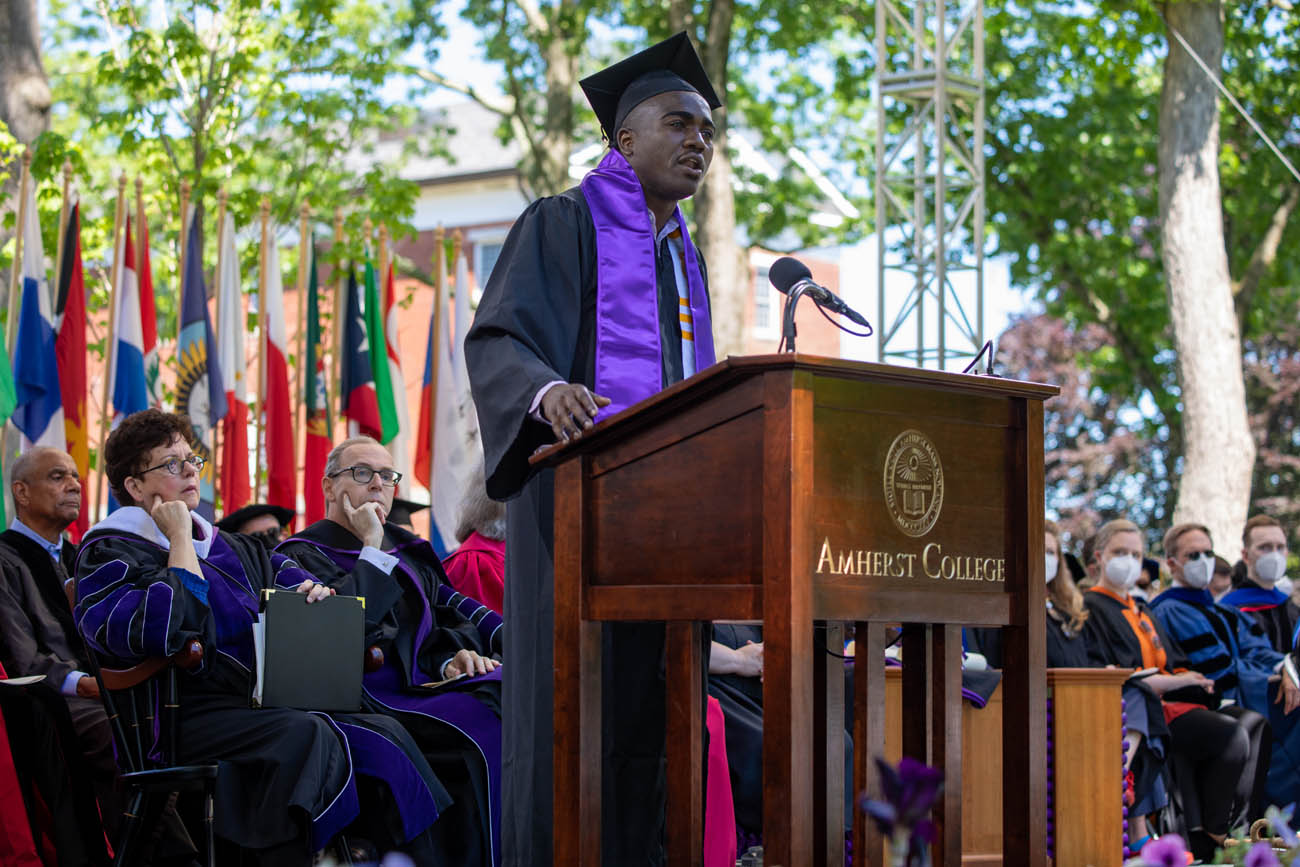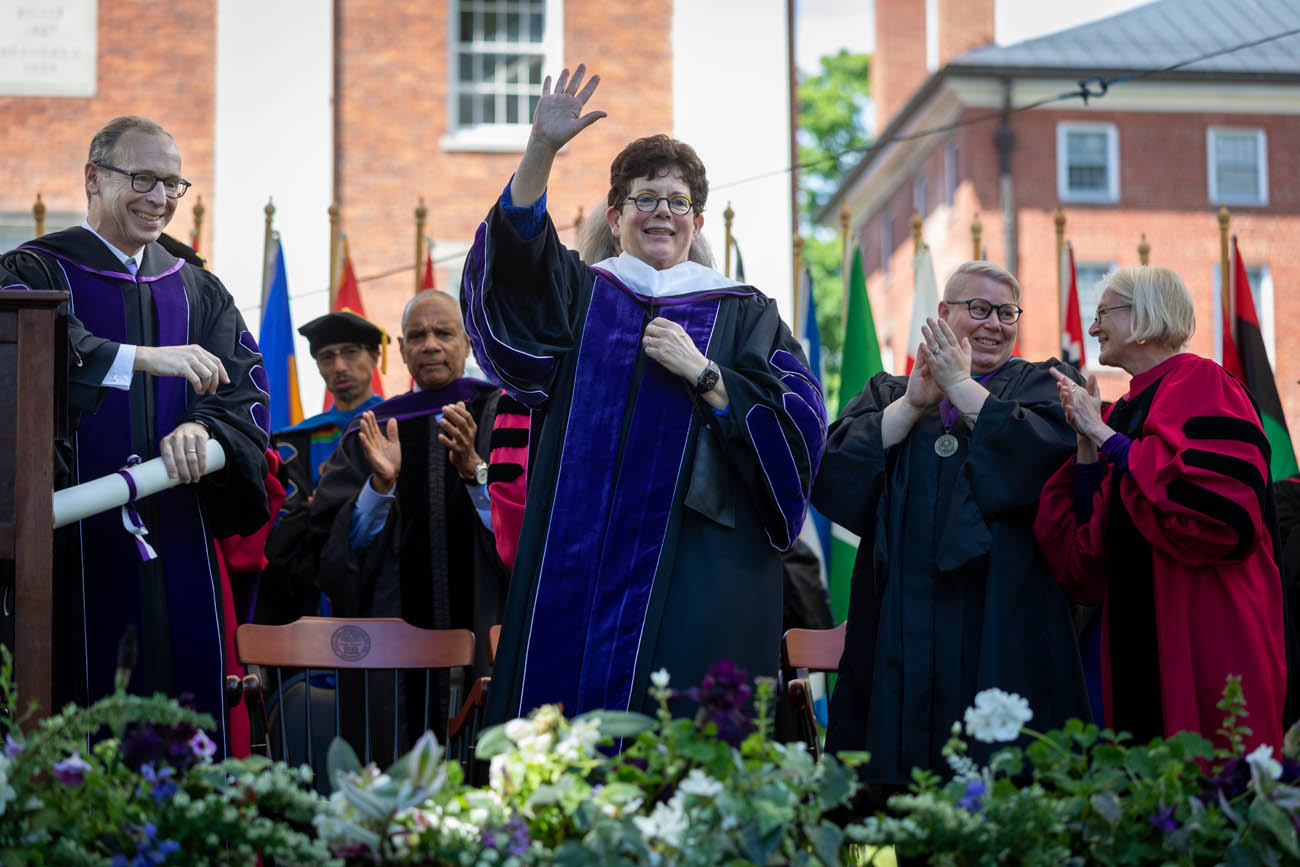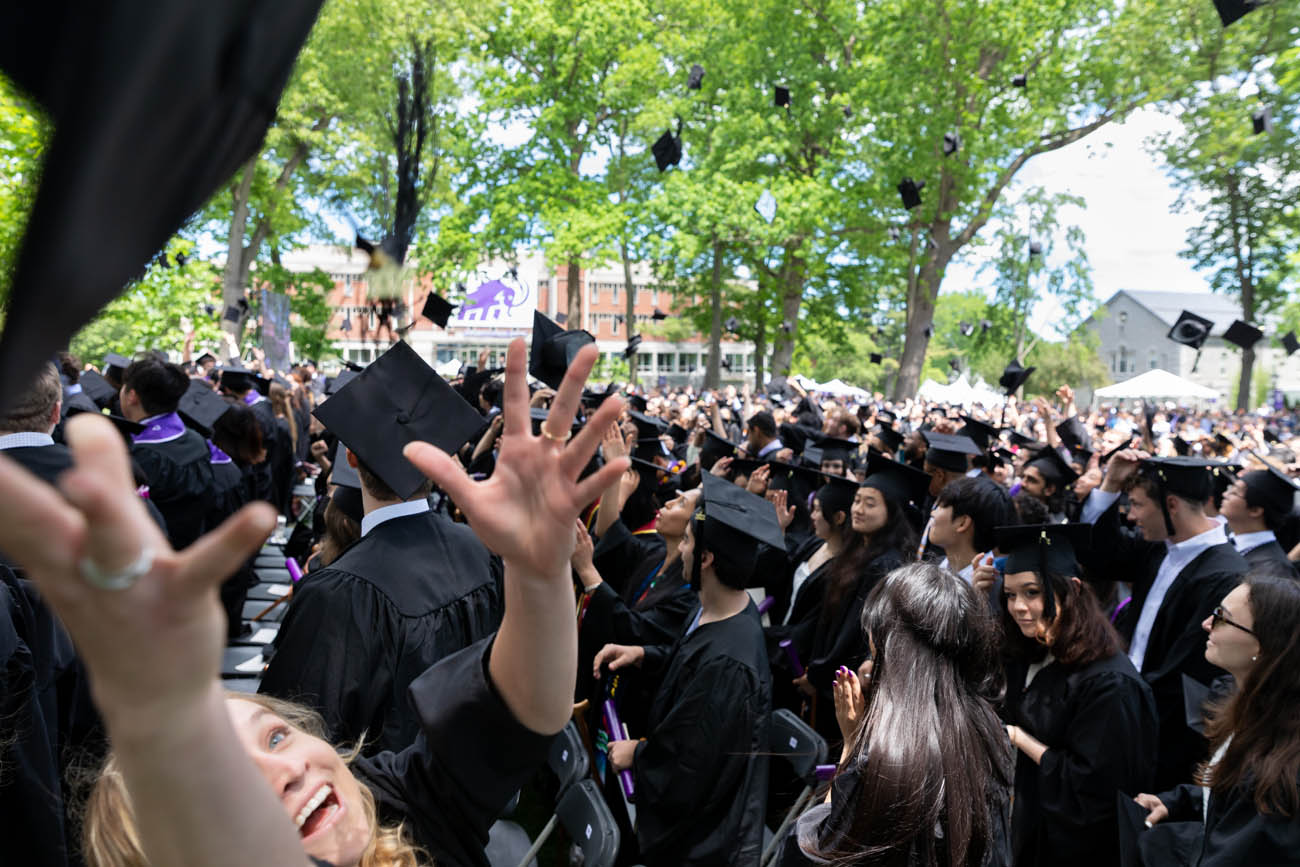Underneath the leafy green canopy of the College’s Main Quad on May 29, Abdullah Brownel ’22 encouraged his 500-plus fellow graduates to “remember the highs, the lows, the happy, the sad” of their college careers–and to actively contribute to the future of their alma mater, to help “shape it into what it should be.”
Brownel, elected by his classmates to give the student speech, delivered this charge during the College’s 201st Commencement, which featured the traditional president’s address, student choral performances, and the awarding of honorary degrees to four guests, among other highlights. It was the first ceremony at that location in three years, as the exercises in 2020 and 2021 were held online and indoors in Coolidge Cage, respectively.
The event also featured a surprise for President Biddy Martin: She was awarded an honorary Amherst doctorate by Andrew J. Nussbaum ’85, chair of the College’s Board of Trustees, just before the graduates received their bachelor of arts degrees.
And what a day it was for the exercises. The weather the previous day was cloudy and rainy, but Commencement brought the opposite: temperatures in the 70s as occasional puffy clouds drifted across the bright blue sky. An estimated 5,000 friends and relatives came to campus to celebrate the graduates in a weekend of events.
The Class of 2022 Commencement website will be updated during the week of May 30 with photos of the ceremony and other moments throughout the weekend, as well as videos and highlights of all of the festivities.
Abdullah Brownel ’22 delivered the senior speech.
‘Celebrate the Dash’
In his speech, Brownel described the concept of what he called “the dash.” The dash is something his mother once pointed out to him, he said: When people die, the days listed on obituaries and headstones are birth and death dates of the deceased, separated by, of course, a dash.
“In focusing on just those two dates, you’re missing out on the most important part, the dash between them,” he told the crowd. “None of us remember when we were born, and we don’t know when we’ll go, but the dash is the summation of all of our life experiences–the highs, the lows, the happy, the sad, the wins and, in my case, plenty of [losses]. That’s what Commencement should be: a celebration of the dash.” And even though the graduates are moving on from the College, he said, “our Amherst dash is ongoing.”
Also ongoing is the College’s own dash. “[Amherst’s dash] started just over 200 years ago, and we’ve all left our imprints on it, to the point where Amherst’s story will forever be a part of our story, and vice versa.”
Brownel went on to tell the stories of two people who he said embodied the symbol: A carpenter, Adam Johnson, from nearby Pelham, Mass., who gave two-thirds of his life savings to help found the College and build campus landmark Johnson Chapel; and William Henry Lewis, a member of the class of 1892. Lewis, the son of enslaved parents, was one of the first Black students to graduate from Amherst, and he went on to an illustrious career in public service, repeatedly breaking racial barriers in the field of law. The culmination of his career was being tapped by President William Howard Taft as assistant U.S. attorney general, the highest-ever federal appointment of a Black person at that time.
As had happened with Johnson, Lewis and many others in the College’s history, “we’re being handed the baton to actively commit our stamp to the ongoing Amherst dash and shape it into what it should be,” Brownel said. “A year from now, when you’re in your cubicle, grad school seminar or wherever you blaze your trail, think of what you’ve learned here, in the classroom and out. Think of the townspeople in 1823, William Henry Lewis or any of the Amherst people before you who’ve answered the call.
“Most importantly, remember the dash,” he concluded. “Remember that our dashes are eternally connected, to each other, to our beloved Amherst and especially to the world around us. Remember our dash.”
President Biddy Martin
‘You Are among the People with the Ability to Make Change’
Martin began her address–the last one she will make to a graduating class before she steps down at the end of July–with a nod to Brownel’s theme, sharing some highlights from their shared Amherst dash.
She reflected on a visit by Supreme Court Justice Ruth Bader Ginsburg in 2019, the opening of the College’s Science Center in 2018, the maturation of landscaping outside of the Greenway Residence Halls and the hiring of a significant number of new faculty members. Martin marveled at the “orchestration” that made students’ achievements possible, particularly during the pandemic. She listed music and dance performances, athletics successes, thesis work and research in lab as examples.
She returned to the theme of friendships, which the graduates had emphasized in a word cloud they created on their first day at Amherst in 2018. She remarked on how often students have reinforced the importance of friendship when thinking about what has gotten them through the past few years. “It will be important to hold those friendships close,” she said, as the graduates disperse from campus. “Like so many things of value, [friendship] takes commitment, attentiveness, effort and time. It takes ongoing cultivation to remain friends.”
She added that it is also important to make “friends with ourselves.” “You are so smart and talented and such good, critical thinkers,” she told the graduates. But “frequently, your doubt, or your criticism can turn inward to yourselves.” Martin then cited advice given by the German poet Rainer Maria Rilke: “Be patient toward all that is unsolved in your heart and try to love the questions themselves, like locked rooms and like books that are now written in a very foreign tongue. Do not now seek the answers.” Rilke suggests that our doubt must become critical, not in a negative sense, but as curiosity and self-knowledge, said Martin, again quoting the poet: “The day will come when, instead of being a destroyer, [doubt] will become one of your best workers–perhaps the most clever of all the ones that are building your life.”
Martin concluded by observing that “there is so much political work to be done.” So many of our institutions need transformative change, she told the graduates, and “you are among the people with the ability and values to make it happen. Please don’t give in to cynicism and despair.” She asked that graduates bear in mind that “it’s easy to destroy institutions, those that uphold a democratic society. It’s much more difficult to build them.”
She closed with A.R. Ammons’ poem, “Salute”—a tradition of hers for many years.
May happiness
pursue you,
catch you
often, and,
should it
lose you,
be waiting
ahead, making
a clearing
for you.
A Surprise Prize
Just prior to the awarding of the bachelor of arts degrees to the students, Nussbaum stepped to the podium in an off-program moment and addressed a visibly surprised Martin. He described an encounter not long after her appointment as president in 2011 when she told him and fellow trustees that she was “glad to be one of you.” Speaking directly to her, he said: “Biddy, we could not be more delighted or more honored to have shared the journey of the past 11 years with you.”
He went on to note some key accomplishments and moments of her presidency, including her arrival just before Hurricane Irene hit campus–“one of many tempests both natural and human-made that you have faced.” He talked about her leadership through the pandemic, support of the College’s academic mission and focus on having fun and creating a culture of inclusion on campus.
“Through it all, we have been charmed by the personal qualities that make Biddy, Biddy,” he said. “Your capacious intellect, your genuine humility, your authentic empathy and your clever sense of humor. You have led us in events both joyous and inspiring.”
As Provost and Dean of the Faculty Catherine Epstein placed an honorary academic hood on Martin’s shoulders, Nussbaum concluded his remarks: “Today, Biddy, we celebrate your Amherst roots. We claim Biddy Martin as one of us. To use your words, [we claim you as] one of our kind.”
Daylin Delgado ’22 (left) nominated her high school English teacher, Neyda A. Borges (right), for a Swift Moore Award.
Honorary Award Winners
In addition to Martin, four leaders in their fields were awarded honorary degrees, including:
- Ken Chenault, chairman and managing director of General Catalyst and former chairman and chief executive officer of American Express
- Raj Chetty, William A. Ackman Professor of Economics at Harvard University
- Charles Gilbert ’71, Arthur and Janet Ross Professor and head of the Laboratory of Neurobiology at The Rockefeller University
- Brooke Kamin Rapaport ’84, deputy director and Martin Friedman Chief Curator at New York City’s Madison Square Park Conservancy
Kenneth Rosenthal ’60 was named this year’s winner of the Medal for Eminent Service for exceptional and distinguished service to the College.
Educators Neyda A. Borges, an English and journalism teacher from Miami Lakes Educational Center in Miami Lakes, Fla; Michael Peck, an English teacher of Lourdes Secondary School in Glasgow, Scotland; and Adrian Rodriguez, a history teacher from Fort Lee High School in Fort Lee, N.J., were honored with Phebe and Zephaniah Swift Moore Awards. The prize, created in 1997 and named after the first president of Amherst and his wife, recognizes teachers who challenged, inspired and moved members of the graduating class. This year’s winners were nominated by their respective former students and graduating seniors Daylin Delgado, Matthew McShane and Sebastian Son.
Emma C. Cape (above left) and Ilyssa S. Forman-Roberts (above right) shared the Obed Finch Slingerland Memorial Prize. The annual award, which was created from the income of a fund established by an anonymous donor, is awarded by the Trustees of the College to a member or members of the senior class, who, during their first three years at Amherst, showed by determination and accomplishment the greatest appreciation of and desire for a college education.






